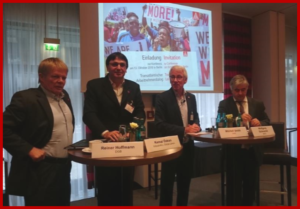 In what could have broad implications for U.S. automakers – particularly those with non-union transplants in the U.S. – German and U.S. union members met in Berlin today to make plans to increase effectiveness on both sides of the Atlantic by”Transatlantic organizing.” It won’t be easy given the prevalence of union-busting in the U.S. even at German companies. The so-called “Transatlantic Labor Dialogue” conference also included the labor umbrella-group IndustriALL, as well as journalists and academics. It was hosted by IG Metall, the powerful German metalworkers union.
In what could have broad implications for U.S. automakers – particularly those with non-union transplants in the U.S. – German and U.S. union members met in Berlin today to make plans to increase effectiveness on both sides of the Atlantic by”Transatlantic organizing.” It won’t be easy given the prevalence of union-busting in the U.S. even at German companies. The so-called “Transatlantic Labor Dialogue” conference also included the labor umbrella-group IndustriALL, as well as journalists and academics. It was hosted by IG Metall, the powerful German metalworkers union.
Leaders from the U.S. unions AFL-CIO and Service Employees International Union discussed “weak U.S. labor law and union avoidance tactics” that make recruiting new members difficult. They also discussed successful campaigns such as Fight for $15, through which it’s said, with evidence, that low wage workers are achieving gains. Although representatives from the UAW and the strong Canadian union, Unifor, although the UAW is working with IndustriALL.
An IG Metall member and leader in the Airbus works council in Germany said that over 80% of Airbus workers in Germany are union members and that they have good “social dialog” with German management. When he visited an Airbus aircraft assembly plant in the U.S. state of Alabama – where employees are trying to organize with IAM – U.S. management told him that the Global Framework Agreement doesn’t apply to the U.S., they don’t want a union in Alabama, and he is not allowed to talk with Alabama Airbus workers. He spoke with the workers as a show of solidarity.
An IUE-CWA member and Siemens employee discussed IG Metall support for a joint initiative by U.S. unions to organize at Siemens, which has signed a Global Framework Agreement with IndustriALL. He said the long-term aim of the initiative is to organize all Siemens facilities in the U.S.
The Chairman of the German Trade Union Confederation Reiner Hoffmann discussed today’s rejection by Germany’s top court of a legal challenge to the proposed EU-Canada trade deal CETA for being undemocratic. Hoffman said he is not opposed to globalization, but trade agreements have “worsened inequality, failed to safeguard social standards and given too many rights to investors.”
IndustriALL Assistant General Secretary Kemal Özkan raised the need for trade agreements to defend labor norms, and ensure democratic control. He also discussed instruments on an international level that IndustriALL uses to confront multinational corporations.
The meeting follows increasing organizing collaboration between IndustriALL affiliates in Germany and the U.S., notably IG Metal and UAW. They recently formed the Transatlantic Labor Institute, which focuses on organizing German auto companies in the U.S. South. The aim is to increase success in the U.S. and maintain bargaining power in Germany.

